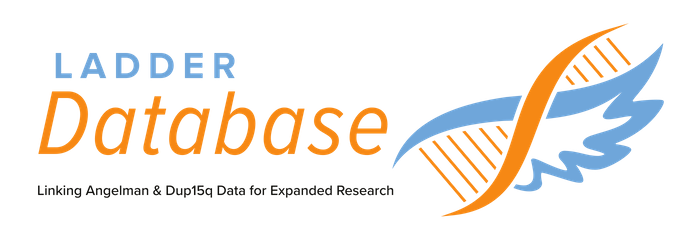For Clinicians
Data collected by clinicians are a crucial source of information—those data help us better understand the needs of patients and guide the development of better treatments for individuals with Angelman or Dup15q syndromes. By submitting data to LADDER, clinicians strengthen our ability to provide integrated information to the research community, and to accelerate the development of empirically based treatment guidelines.
The LADDER Learning Network
The LADDER Learning Network (LLN) (formerly known as the 15q Clinical Research Network (CRN)) is a collaborative effort between the Angelman Syndrome Foundation and the Dup15q Alliance to establish vetted clinics within medical centers across the country, staffed with interdisciplinary clinicians with expertise in Angelman and/or Dup15q syndromes (Click these links for more information about ASF clinics and Dup15q clinics in the LADDER Learning Network). In order to streamline clinical information collected from individuals and families with a chromosome 15 condition across network sites and larger research studies, the LLN, in collaboration with RTI International, has developed the Clinical Needs Study.
The Clinical Needs Study allows families and clinicians to use information collected as part of an LLN clinic visit to contribute to research and treatment guidance decisions through a direct link to LADDER. Information collected as part of this study can also be provided to the clinicians for use in treatment planning.
The Clinical Needs Study
A REDCap survey will be used to systematically capture and organize clinical information about individuals with Angelman or Dup15q syndromes. All participants in the study are caregivers of an individual with a Angelman syndrome or Dup15q syndrome who have enrolled in LADDER. The survey will allow capture of standardized comprehensive clinical evaluations as well as caregiver and clinician reported survey data. All research participants will be required to give permission for their data to be stored in the LADDER database and linked to their extant data in LADDER. If participating in other studies or registries, the database provides a centralized data system. Permission to participate in the research study and share information with the database will be voluntary. No one will be refused care and care will not differ based on study participation.
RTI International will collect, house, and curate the data. RTI has established expertise in the development and management of complex research databases and websites to provide information and support to stakeholders while maintaining strict security regimens to protect the data and maintain confidentiality.
De-identified data will be used to generate knowledge about the conditions in research and lay publications as well as for pilot data in preparation for further research studies.
Already Participating in the Clinical Needs Study?
Click here to access your clinic portal.
Getting Setup with the Clinical Needs Study
To begin collecting data through the clinical needs study, you will need to get approval through your Institutional Review Board (IRB). First, you will determine if your institution will consider ceding oversight to our centralized IRB, Advarra. Depending on this decision, you will either follow institutional procedures to establish a reliance agreement or submit the study to your IRB independently.
More information can be found via the links below:
Frequently Asked Questions
What happened to the "LADDER forms"? Are these different?
- The surveys included in the Clinical Needs Study are the LADDER forms. LADDER, as a data repository, is exempt from IRB; however, this active data collection does require IRB oversight. AS such, we developed the Clinical Needs Study and embedded what was formally called LADDER forms, into the protocol as the caregiver survey and clinician survey forms.
How will participation in LADDER help me help my patients with Angelman syndrome or Dup15q syndrome?
- With rare neurogenetic conditions like Angelman syndrome and Dup15q syndrome, every voice matters! LADDER is a mechanism by which we are able to maximize the impact of both clinically and research-derived information on patients with these conditions. In turn, treatment guidelines can be published based on data captured from real-life patients and their medical providers.
Will the Clinical Needs Survey provide all of the information needed for a clinic visit? What if standardized tests are administered?
- In developing the Clinician Needs Survey, we elicited feedback from clinical experts in AS and/or Dup15q from around the world. Every effort has been made to assure a comprehensive tool. However, LADDER has been set up to accept additional information from clinic visits, including standardized assessments, EEGs, imaging studies, etc. These can be uploaded in raw form for entry at RTI or they can be directly entered by clinic staff. For more details on including additional data or if there are questions you would like to see added to the study please contact the LADDER team.
How will clinical information be collected?
- Clinic staff will be provided with a link to enter clinical information directly into the participant's REDCap survey housed at RTI. Data entry can take place during or after the clinic visit.
What if a patient does not want to participate in LADDER?
- They can complete the Clinical Needs Study survey questions through the clinic's own REDCap (or similar electronic or paper intake procedures). Please contact us for more details if you do not already have the information needed for the local forms.
How do I get information about my patient who has decided to participate in LADDER and the Clinical Needs Study to prepare for a visit?
- Each clinic will have their own sign in and access via a secure server. Clinics will only be able to access information about patients that will be attending their clinic.
What about the LLN contract, how does this work into the Clinical Needs Study and LADDER?
- For all questions about your LLN contract please contact Eileen Braun (ebraun@angelman.org).
